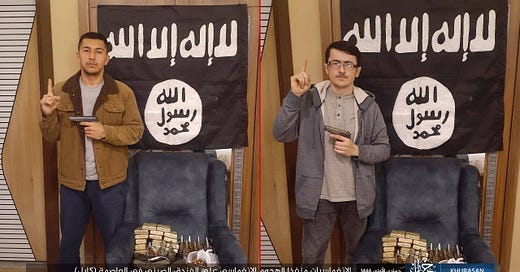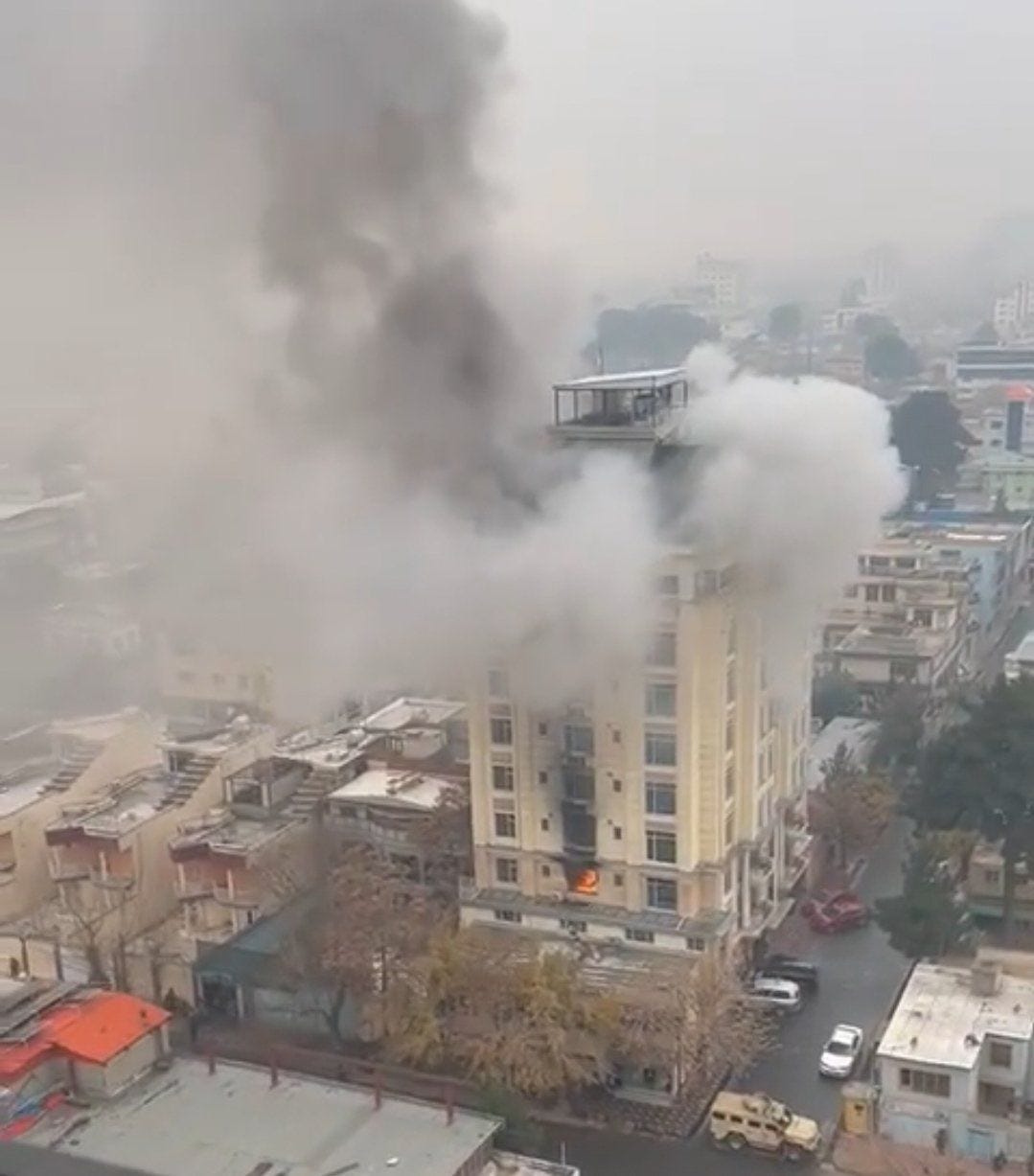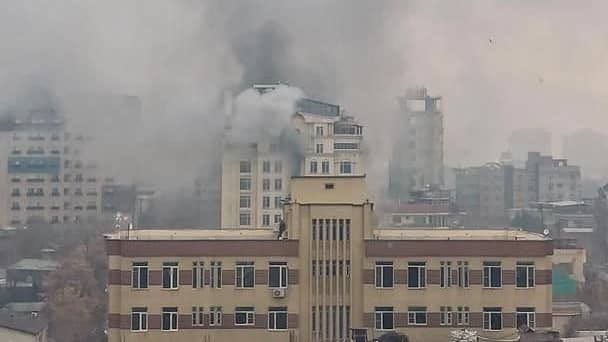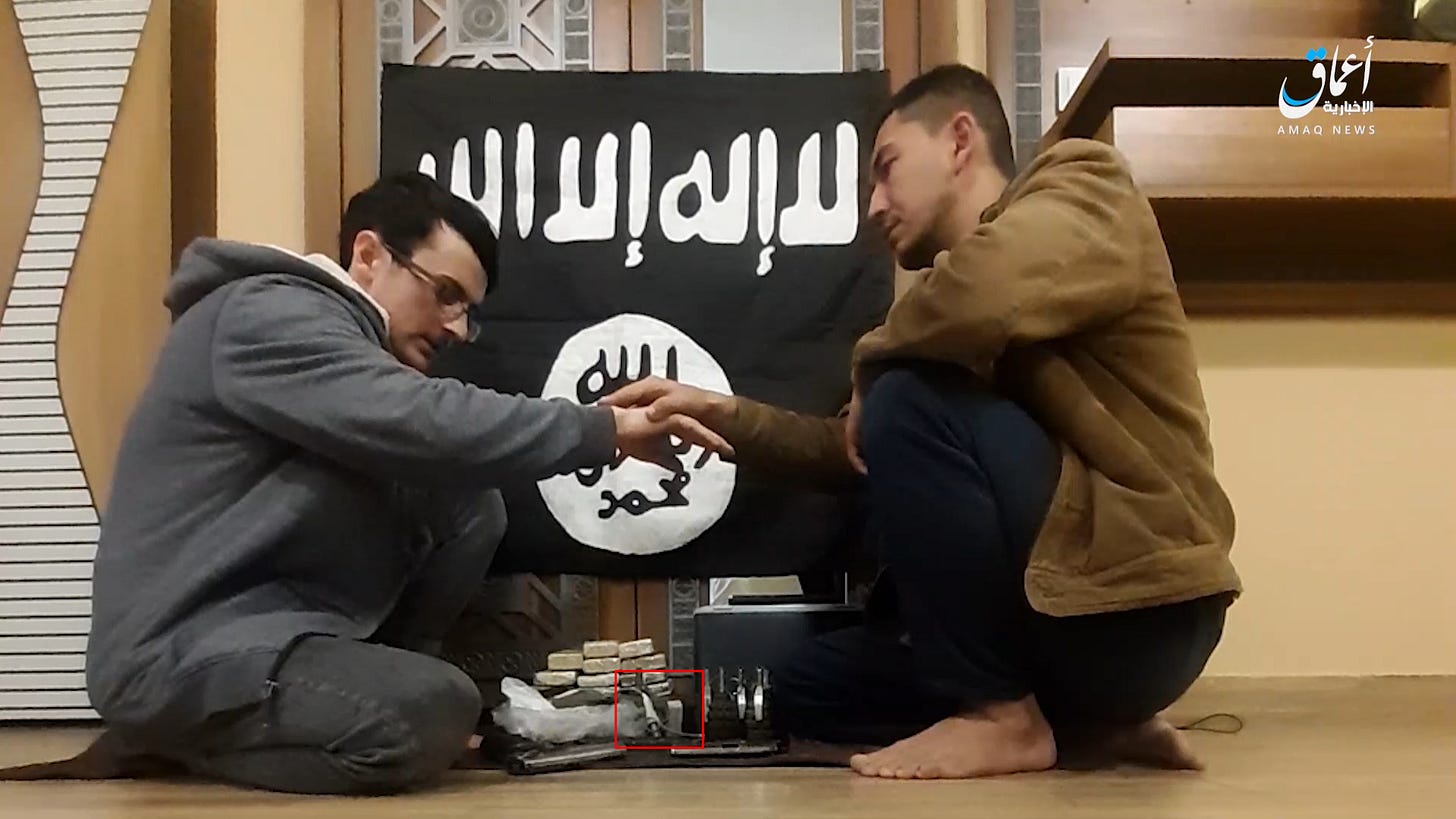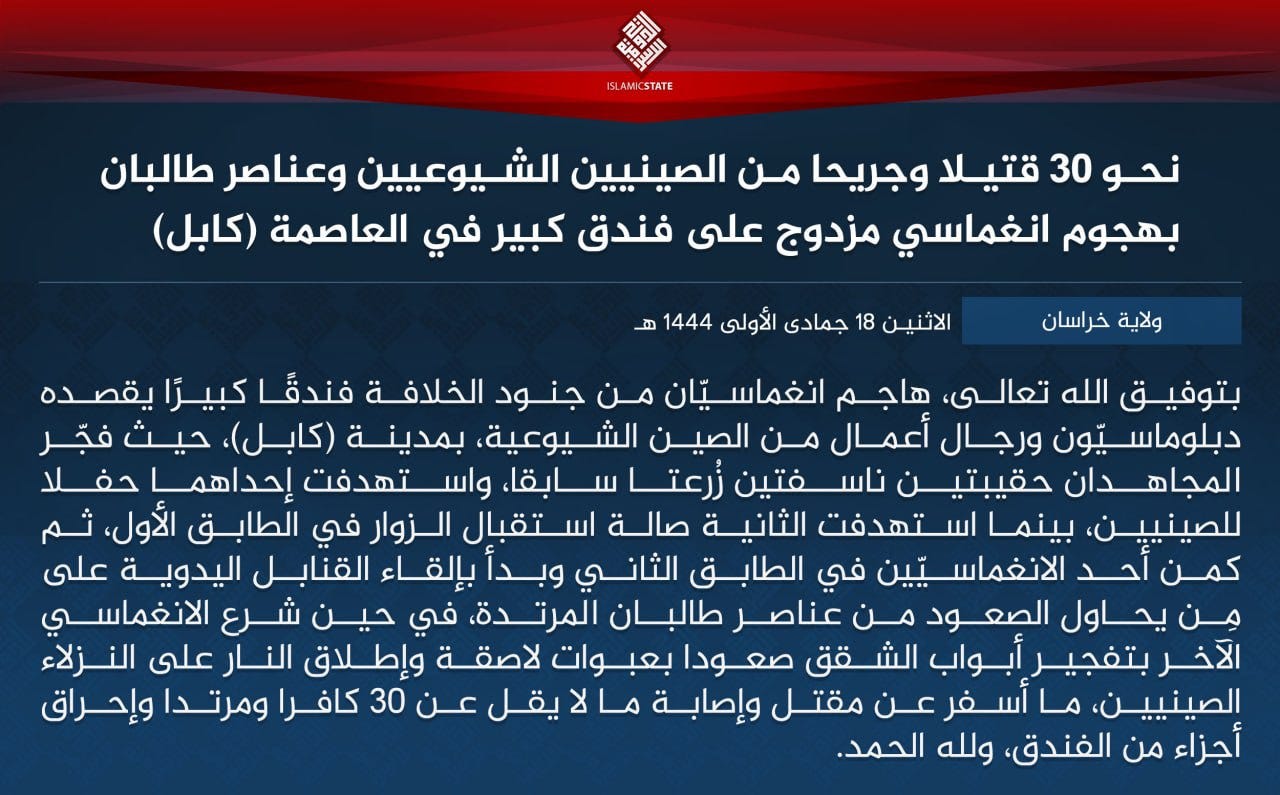Kabul Hotel Attack: Islamic State Khurasan Targets Chinese Nationals with Pistols, Grenades, and Explosives
On December 12, multiple Islamic State (IS) militants stormed a hotel in the Afghanistan capital city of Kabul that is known to commonly host Chinese businessmen. Hours after the attack, IS officially claimed responsibility and said Islamic State Khurasan Province (ISKP) gunmen raided “a big hotel frequented by Chinese diplomats and businessmen in Kabul, where they detonated two explosive devices hidden inside two bags”, also throwing grenades and shooting at Chinese “Communists” and Taliban forces. Shortly after the statement was released, IS published photos and a video of the attackers taken prior to the operation.
The Taliban quickly went into damage control mode claiming that only two foreign residents were injured after jumping out windows to escape. However, contradicting these statements, the Emergency Hospital in Kabul said they “received 21 casualties – 3 were already dead on arrival.” The Islamic State put the number of killed and wounded even higher at 30.
Adding to the Taliban’s humiliation, the attack took place the day after the Chinese Ambassador to Kabul Wang Yu expressed “dissatisfaction” about the state of security in the country and urged the so-called Islamic Emirate of Afghanistan (IEA) to better protect the Chinese Embassy in Kabul. These comments also come on the tail of ISKP operations against other foreign targets including the successive attacks on the Russian and Pakistani embassies in Kabul.
Militant Wire now offers regularly published research and analysis accessible to paid subscribers. Recent exclusive articles include:
• Manufacturing the Revolution: Weapons and Explosives Craft-Produced by Myanmar's Anti-Junta Fighters
• Communist Guerrillas Ambush Philippine Soldiers Reportedly Conducting Disaster Relief Operations
• Weapons of the Turkish Black Market
• Accelerationist Neo-Nazi Propaganda Group Releases New Documentary, "White Terror"
• Analysis: Possible Islamic State-Inspired Attack in Grozny Comes Amidst Surge in Anti-Russia Jihadist Propaganda
• An Investigation into Rising Tajik Islamic State Groups Recruiting Central Asians to Fight in Afghanistan
• The Life and Death of Asadullah al-Urgenchi: Islamic State Khurasan Eulogizes Influential Uzbek Ideologue
• October Bratislava Terror Attack: Far Right Gunman was Deeply Immersed in Online Accelerationism
• Al-Shabaab Continues Anti-China Campaign, Publishes Report on Chinese Influence Expansion in East Africa
The attack is significant as it is ISKP’s first successful strike against Chinese interests in Afghanistan and the first Islamic State attack against Chinese nationals in the region since 2017 when two teachers were kidnapped and killed by the group in Pakistan.
ISKP has become the most hawkish anti-China IS branch, and the hotel attack is a marked escalation and notable leap from increasingly bellicose rhetoric to actual direct action. Over the past year or so, ISKP has ramped up criticisms and threats toward China over Beijing’s crackdown on Uyghur Muslims in Xinjiang as well as Chinese influence expansion in Pakistan and Afghanistan.
When it comes to the Islamic Emirate of Afghanistan, ISKP has taken aim at the Taliban’s diplomatic activities and cordial relations with countries viewed as enemies of Islam. ISKP also knows that the Taliban looks to China for help as it faces a dire humanitarian crisis and deep economic troubles. The hotel attack was in part an attempt to undermine IEA-China relations and minimize any outside support that may strengthen the Taliban’s position. ISKP’s attacks on high-profile targets in Kabul are also purposed to expose the Taliban’s inability to protect important facilities and foreign nationals in the IEA’s own capital city.
Analysis of Weapons and Tactics Used
In the published photos and video, the militants appear to have used a pair of pistols, multiple shells, grenades, and explosive blocks to carry out the attack.
These Makarov PM-type pistols are common in the region and are chambered in 9x18mm. One of the pistols has a black rib, which resembles the East German Makarov called "Pistole-M". In addition, the militants have a large number of 9x18mm ammunition, F-1 grenades, and explosives.
An UZRGM fuze is visible on an explosive belt and was likely taken from a Soviet patterned hand grenade: F-1 or RGD-5. During and before the attack, a few interesting details can be discerned.
The militants seem to have been positioned in a room inside the hotel before the attack - this is where their photos were probably taken. Acting covertly, they also shaved and chose casual clothing to fit in and appear as foreign guests.
In the claim of responsibility, IS describes how the militants detonated explosives and then attacked Taliban members before they targeted Chinese hotel guests. It is possible that the ISKP militants seized heavier weapons from the Taliban, such as automatic rifles, and used these during the hotel raid.
Assessment
The Kabul hotel attack serves to harm two ISKP enemies at once - the Taliban and China. This also fits seamlessly with ISKP’s strategy of hitting international targets to expose the Taliban’s inability to provide security in their own capital city and to protect important foreign interests. Just as the rocket attacks against Uzbekistan and Tajikistan were meant to reduce regional confidence in the IEA’s capacity to secure its borders, the operations against the Russian and Pakistani embassies and on the hotel are, in part, designed to make the Taliban look incompetent as a ruling body. Given the Taliban’s limited counter-terrorism capabilities and the aforementioned ISKP targeting approach, it is likely that the Islamic State will continue plotting against and attacking foreign interests and Chinese nationals.

